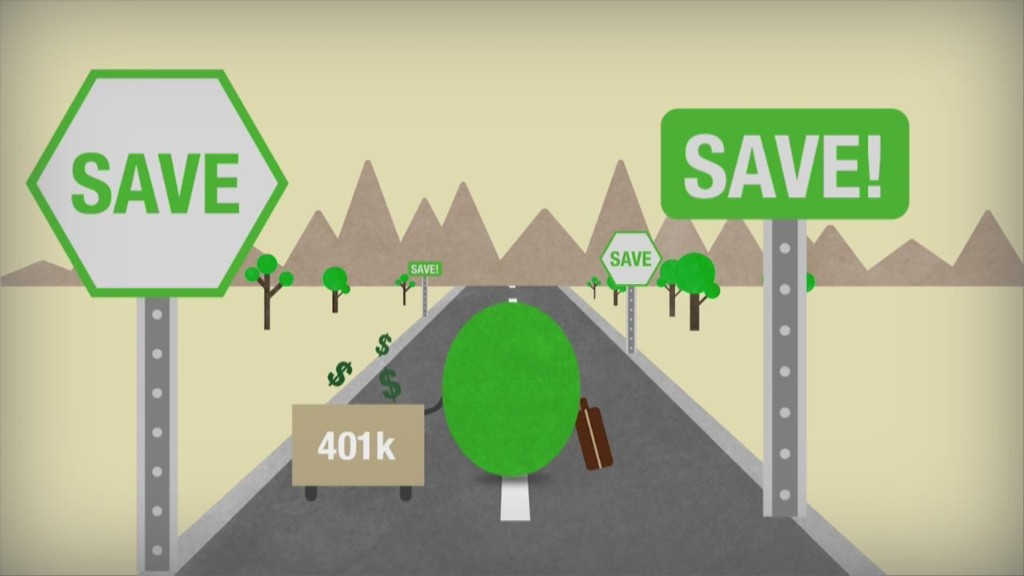
Jake Walker in Michigan asks:
I am 25 and wonder how I'll retire since I won't have a pension like my parents. Last year, I bought a rental property and my return was much higher than what I saw on my 401(k) and Roth IRA. I look at this as a way to diversify my portfolio and also generate cash flow in retirement. Basically, my version of a pension. Is this a good approach to have?
Jake Walker is doing a lot better financially than most of us are at 25 years old. Since he tells us he's already maxing out his 401(k) and saving money in a Roth IRA, adding real estate to his retirement portfolio could be a smart move.
"I think it's a really smart idea to look at real estate as an income-producing pension replacement," said Maggie Kirchhoff, a CFP at a Colorado- based firm called Business & Personal Finance.
She's seeing more Millennial clients looking at rental property as an option and became a landlord herself to add diversity to her portfolio.
As you've probably guessed, there are some downfalls to investing in real estate. If you don't already have your own emergency fund and stock investments in some traditional retirement accounts like Walker does, you're probably not ready for a rental property. (And becoming a landlord may never be for you.)
But there are still ways to make real estate a part of your investment strategy.
Here's what financial planning experts have to say:
Why it could be a good idea:
1. The more kinds of investments you have, the better.
Diversification is important, especially when you're saving for something so far into the future. You invest in a variety of stocks because when one sector falls, others hopefully don't. And you invest in bonds because they aren't as volatile as stocks, and tend to move in the opposite direction. Diversification reduces the risk of losing a big chunk of money at once.
"Real estate is great for adding diversity to your portfolio. It's tied to the market like anything, but it's not going to be correlated the way stocks and bonds are," said Angela Coleman, a CFP at the Kentucky-based Unified Trust Company.
She said not to expect property value or rent to ever jump significantly. While that sometimes happens, steady growth over time is more likely.
Related: Will I ever be able to retire like my Grandma?
2. The second and probably more obvious benefit is the cash you'll get from charging rent.
In the beginning, you won't see a lot of this money. First, you have to cover your mortgage payments. Then you have to pay for things like insurance, taxes and any homeowner fees. Expect those three expenses to take up at least 25% of the rent, Coleman said.
And don't forget about the cost of any maintenance the property needs or gaps between tenants. She suggests putting aside some money from the rent to build an emergency fund.
But hopefully you'll have paid off the mortgage in 30 years and by the time you retire. If you choose to continue renting out the home, you're looking at a stream of income. Or you could choose to live in the home or sell it altogether.

Why it might not be for you:
1. Surprises. You never know when the AC might break, the roof could leak, or a pest problem could turn up.
2. Becoming a landlord can be a lot of work. "There's always the worry that you can't find a quality tenant. Finding tenants, processing their applications and running background checks is definitely time consuming," Kirchhoff said.
You could hire a management company to do that work, but that will eat up even more of your rental income.
Related: Why my 401(k) didn't earn as much as the market
3. It's a big commitment. You're not tied to contributing to your 401(k), IRA or mutual fund. But that's not the case with a rental property, said Coleman. You must pay the mortgage, taxes and insurance. And if the roof leaks, you have to fix it.
If you decide to invest in rental property:
1. Build an emergency fund separate from your personal savings. Save at least the amount of the highest deductible on your insurance policy, Coleman said.
2. Do your research. There are different laws in different states that landlords have to follow, Kirchhoff said.
3. Be prepared to put at least 20% down when buying a property you're going to rent.
If it's not for you:
Maybe renting out a house or apartment is more responsibility than you're willing to take on right now. Or you may live in an area where property is just too expensive. You can still make real estate a part of your retirement savings by investing in Real Estate Investment Trusts, or REITs.
"It could be a good idea to invest in an exchange-traded REIT for someone who can't quite jump in on owning property yet," Kirchhoff said.
REITs are funds that invest in variety of real estate, including residential and commercial, or mortgages. An exchange-traded REIT trades just like a stock so you can invest in one through an IRA or other retirement account. While it shouldn't make up the bulk of your investments, adding a small percentage of real estate funds adds another level of diversity to your portfolio. But it won't, of course, generate cash flow like you'd expect to see from a rental property.
Money is hard. We're here to help. Ask us your questions by emailing FromRamenToRiches@turner.com.

